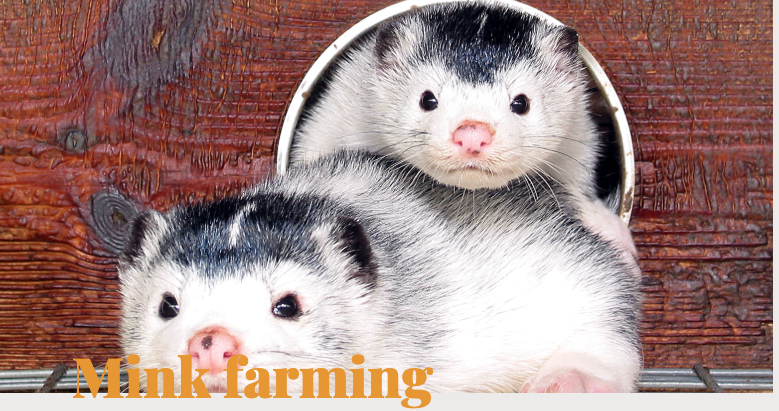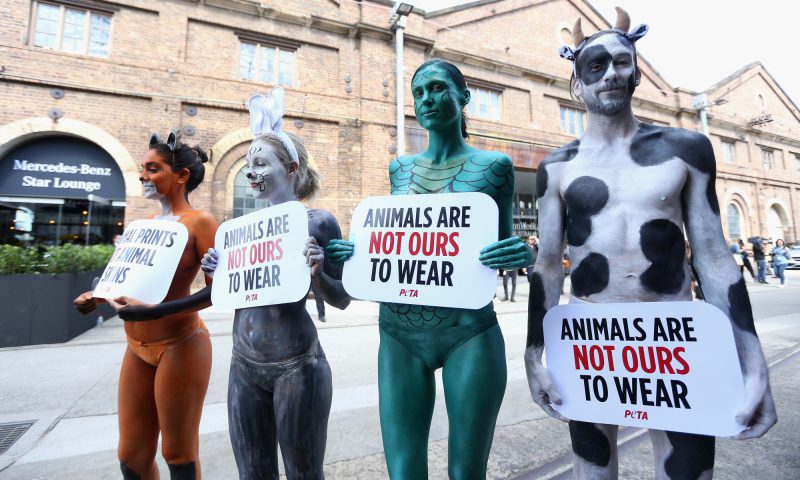
Assemblywoman Laura Friedman. (Kevin Sanders for California Globe)
California Legislature Passes Bill to Ban Fur Industry, but will Governor Newsom Sign It?
Animal extremists behind California fur ban legislation
By Katy Grimes, September 12, 2019 2:08 am
The California Legislature Wednesday passed legislation to outlaw new fur products sold to consumers, including mink, rabbit and coyote, knowing after months of testimony, they are putting many retailers, fur farmers and ranchers out of business. Should Gov. Gavin Newsom sign AB 44, California would be the first state to ban the sale of new fur products.
Sen. Brian Jones (R-Santee) said that after hearing from different cultural groups, what wasn’t acknowledged was the push to ban fur discriminates against Native American and African American communities whose cultures value fur products. “There’s no reason for this bill other than one class of society telling another class of society what they can and cannot wear,” Jones said.
“I didn’t come to Sacramento to shut down legitimate business or industry – the free market does that, “Sen. John Moorlach said.
Sen. Hannah Beth Jackson, who was the Senate representative for AB 44, was caught on a hot mic Tuesday with an uncomfortable comment. During Senate debate, Sen. Brian Jones (R-Santee) told a sweet story of how his hard working class great-grandfather saved up to buy his great grandmother a fur shall, which was one of her prized possessions. Sen. Jackson said, “Have him send her flowers,” into the hot mic.
"Have him send her flowers," @SenHannahBeth caught on hot mic during fur ban debate (AB144 Friedman) when @SenBrianJones told sweet story of great grandfather saving up to buy great grandmother a fur shall which was 'one of her prized possessions.' pic.twitter.com/6HuHRLd2bY
— Katy Grimes (@KATYSaccitizen) September 10, 2019
Sen. Jackson even said “there is no way to humanely source fur,” and called Furmark “a codification of abusive practices.” FurMark is the certification program that provides consumers with the reassurance they need to confidently buy fur. Furmark operates to ensure the highest welfare and environmental standards. It is a guarantee of good animal welfare and improved sustainability of the sector.
Rather than enforcing the many safety laws from violent animal activists who have been arrested for splashing flesh-eating acid and other chemicals on the outside of a San Diego fur store, and gluing the locks and spray-painting anti-fur screeds on the store’s exterior, the Legislature voted to ban the sale of fur.
Assemblywoman Laura Friedman (D-Glendale) called fur a “fashion statement and statement of wealth. There is no need for warmth” from fur, she said in a recent hearing, mentioning the many faux fur products available.
The fur trade ranks as one of America’s oldest, continuously operating industries, with more than 400 years of history. The fur industry in the United States comprises more than 1,000 fur retailers, 100 manufacturers, more than 200 small family farmers, and tens of thousands of trappers, all of whose businesses, jobs and livelihoods depend on the industry. Retail fur sales in California alone exceed $300 million, and is an important source of employment and tax revenues to the State.
For the fur activists who claim to care about animal welfare, fur farming is among the most sustainable forms of animal agriculture. As explained to the California Globe, in the U.S., animals raised on fur farms are typically fed leftover proteins from food processing plants that humans do not eat, thereby diverting 390 million pounds of waste that would otherwise go to landfills. The manure generated by animals raised on fur farms is used as a rich fertilizer on local agricultural crops. The by-products from the animal are used in many ways, e.g., the meat of the animal is used as bait for the crab fishing industry and as a biofuel and the oil from the animal is used in the cosmetics industry or as a leather conditioner. Virtually no part of a farmed fur animal goes to waste. Fur farming is consistent with the policy objectives of California to promote environmentally sound and sustainable agriculture and industry.
Hey @NYCSpeakerCoJo – why destroy thousands of blue collar jobs that are #MadeInNYC? Tell the @NYCCouncil that enough is enough. #NoFurBan pic.twitter.com/w4lBC0gLYf
— FURNYC (@furnyc) May 15, 2019
In June the Center for Consumer Freedom filed a complaint with the IRS and FBI regarding PETA and two California-based groups called Direct Action Everywhere (DxE) and Animal Hope and Wellness Foundation. “These are radical groups lobbying to dictate lifestyle decisions on Californians–and we believe these organizations have abused the nonprofit tax code,” Will Coggin with The Center for Consumer Freedom explained.
“One of the bill’s sponsors, Animal Hope in Legislation, is run by a fellow named Marc Ching. Ching spent nearly a decade in prison for kidnapping, according to court records,” The Center for Consumer Freedom reports. “Post-prison Ching started an animal rescue organization that was the subject of a shocking exposé for its conduct in Asia. Ching’s operation allegedly left hundreds of dogs to die in the hands of Buddhist sanctuaries that did not believe sick animals should be treated. According to a volunteer who went on the rescue attempt, it was a disaster from the beginning.”
“Harassing people, and breaking into people’s farms isn’t what a charity does,” Coggin said. “Banning fur is an unacceptable use of the government as morality police for special interests.”
Assemblywoman Friedman claimed she had not heard from fur industry retailers, however this is not true. “The first casualty in this legislation was the truth,” Kaplan said.
Fur industry representatives have offered amendments to Friedman four different times, “which she failed to accept or even discuss,” Keith Kaplan, Fur Information Council of America, said.
Teli Spyropoulos, President of BC International Group, Inc., one of the largest fur retailers, sent a letter to Friedman sharing his opposition to her bill, challenging her claim that she has not heard from any retailers:
“Many people (myself included), within our organization have been submitting letters since the bill was originally introduced to Assembly Members, Senators and to each of the committees who have heard AB44 to date,” Spyropoulos said.
The legislation received strong support from animal rights advocates, including the Humane Society of the United States.
“If you really want to get [new] fur that bad, go to Vegas,” said Marc Ching, founder and president of Animal Hope in Legislation, the animal rights group behind AB 44 and the Los Angeles ban. “We’re residents and we know a lot of people here who are against fur,” the Los Angeles Times reported.
Furriers located in California say their businesses will never survive if AB 44 is signed into law.
- New BLS Data Shows Union Membership Drives Falling Flat - February 19, 2026
- NY Federal Reserve Tariff Report an ‘Embarrassment’ - February 19, 2026
- Legislation Would Conceal California High-Speed Rail Records from Public - February 18, 2026




